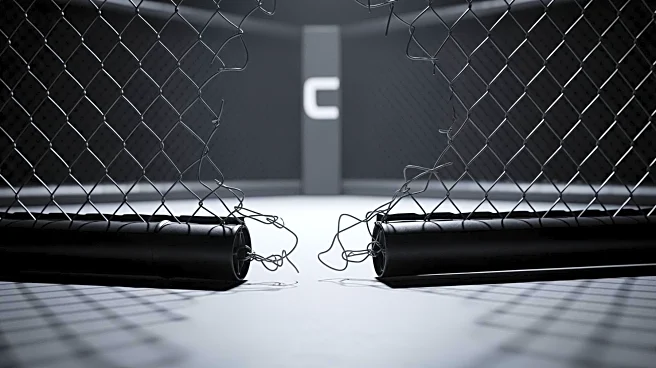What's Happening?
During UFC 322 at Madison Square Garden, a significant brawl erupted involving MMA fighter Dillon Danis. UFC CEO Dana White took responsibility for the incident, acknowledging that Danis was present in the arena
despite previous controversies. Danis, known for his involvement in a 2018 brawl at UFC 229, was seated in fighter seats, which led to tensions. White was informed of Danis's presence and potential threats from a retired UFC fighter, but decided to let Danis remain. The situation escalated when a group associated with Islam Makhachev, who was fighting in the main event, clashed with Danis. White expressed regret over the oversight and announced that Danis would be banned from future UFC events.
Why It's Important?
The incident highlights ongoing security and management challenges within major sporting events, particularly in combat sports like UFC. Dana White's decision to ban Dillon Danis from future events underscores the organization's commitment to maintaining order and safety. This development may impact UFC's reputation and operational protocols, as it seeks to prevent similar occurrences. The ban on Danis could also affect his career trajectory, limiting his participation in high-profile events. Stakeholders, including fighters, fans, and sponsors, may reassess their involvement with UFC based on its handling of such incidents.
What's Next?
UFC is likely to review its security measures and seating arrangements to prevent future disruptions. Dana White's decision to ban Dillon Danis may lead to legal or contractual discussions, as Danis navigates the implications for his career. The organization may also face scrutiny from fans and media regarding its event management practices. UFC could implement stricter policies for ticket distribution and monitor potential conflicts more closely. The incident may prompt other sports organizations to evaluate their security protocols to ensure the safety of participants and attendees.
Beyond the Headlines
The brawl at UFC 322 raises questions about the cultural and ethical dimensions of sportsmanship and conduct in combat sports. The involvement of groups associated with specific fighters highlights the complex dynamics of loyalty and rivalry in the sport. UFC's handling of the situation may influence public perception of the sport's integrity and professionalism. The ban on Dillon Danis could serve as a precedent for addressing misconduct and ensuring accountability among athletes.









